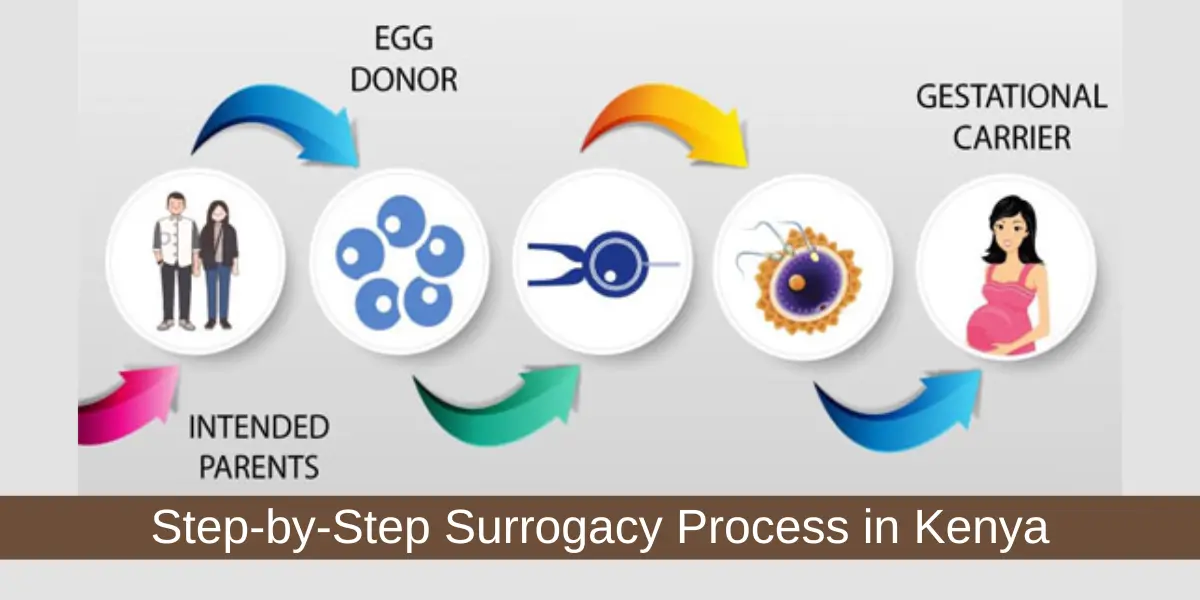Surrogacy in Kenya has become a preferred option for many intended parents who want a safe, affordable, and well-supported path to parenthood. Whether you are a heterosexual couple, a single parent, or an international parent traveling to Kenya for fertility care, understanding the full surrogacy process is extremely important. This guide explains every stage in a simple and clear way — from choosing a clinic all the way to taking your baby home.
Introduction: Why Surrogacy in Kenya?
Kenya has emerged as a popular destination for surrogacy because of its skilled medical professionals, modern fertility clinics, and relatively affordable costs. Intended parents also find the legal environment manageable with the help of experienced lawyers and agencies.
While Kenya does not have a specific national surrogacy law, the process runs smoothly when handled through reputable clinics and legal experts who prepare detailed agreements and make sure all sides follow ethical and medical standards.
If you are planning your surrogacy journey in Kenya, this step-by-step guide will walk you through everything you need to know.
Step-by-Step Surrogacy Process in Kenya
-
Initial Research and Choosing a Surrogacy Clinic or Agency
The first step is choosing the right clinic or surrogacy agency in Kenya. has several fertility centers that offer IVF, egg donation, embryo transfer, and full surrogacy programs.
What to look for in a Kenyan surrogacy clinic:
- A licensed fertility specialist with good success rates
- Clear surrogacy program structure and pricing
- In-house IVF lab and medical team
- Legal support for agreements and documentation
- Good communication and transparency
- Experienced surrogates who are screened medically and psychologically
Many intended parents prefer agencies that provide end-to-end services, including surrogate matching, legal work, medical care, pregnancy monitoring, and baby handover support.
-
First Consultation with the Clinic
Once you select your clinic or agency, the next step is the first consultation.
What happens during this consultation?
- You meet the fertility specialist (online or in person).
- You share your medical history and treatment expectations.
- The clinic explains surrogacy options, the medical steps, timelines, and costs.
- You discuss whether you will use your own eggs/sperm or donor gametes.
The goal of the first consultation is to create a personalized plan for your surrogacy journey in Kenya.
-
Medical Evaluation for Intended Parents
Before the surrogacy program begins, intended parents must undergo some medical tests. These tests ensure that the sperm, eggs, or embryos used are healthy and suitable for pregnancy.
Common medical tests include:
- Hormone tests for women
- Blood tests (HIV, Hepatitis B & C, Syphilis)
- Semen analysis for men
- Ultrasound scans (if the mother wants to use her own eggs)
If the mother cannot use her own eggs or if a single man is choosing surrogacy, donor eggs are used. Clinics in Kenya offer well-screened local and international egg donors.
-
Surrogate Screening and Matching
Once you are medically cleared, the clinic begins the surrogate matching process. Surrogate mothers in Kenya go through strict evaluations to ensure they are physically and emotionally ready.
Surrogate screening includes:
- Full medical tests
- Gynecological examination
- Psychological assessment
- Background and lifestyle verification
- Previous pregnancy history (most Kenyan surrogates are already mothers)
After screening, the clinic shares surrogate profiles with you. You can select the surrogate you feel most comfortable with.
Matching includes:
- Meeting the surrogate (online or in person)
- Understanding her background, family support, and communication preferences
- Ensuring compatibility between both sides
-
Legal Contract Between Intended Parents and Surrogate
Because Kenya does not have a specific surrogacy law, legal agreements play a very important role. A detailed surrogacy contract protects the rights of both the intended parents and the surrogate.
The legal contract usually covers:
- Responsibilities of the surrogate
- Responsibilities of the intended parents
- Compensation and allowances
- Medical care arrangements
- Confidentiality terms
- Parental rights confirmation
- What happens in case of complications
- Delivery plan
Both parties sign the agreement in front of a lawyer. This contract becomes the foundation of the entire surrogacy process.
-
IVF Procedure and Embryo Creation
After the legal work, the medical surrogacy procedure begins.
What happens in IVF in Kenya?
- If using the mother’s eggs, she undergoes ovarian stimulation.
- Eggs are collected and mixed with sperm in the IVF lab.
- If using an egg donor, the clinic uses screened donor eggs.
- Embryologists create embryos and monitor them for 3–5 days.
- The healthiest embryo(s) are selected for transfer.
Using donor sperm or donor embryos
Some intended parents choose donor sperm or donor embryos depending on medical needs. Kenyan clinics guide you through all donor options.
-
Embryo Transfer to the Surrogate
When the embryo is ready, the clinic prepares the surrogate’s uterus. This includes:
- Hormone medications
- Ultrasound monitoring
- Regular check-ups
The embryo transfer is a painless and quick procedure. After the transfer:
- The surrogate rests for a short period.
- She continues medication to support early pregnancy.
- A pregnancy test is done after 10–14 days.
If the result is positive, the pregnancy officially begins.
-
Pregnancy Monitoring and Care
The surrogate receives full medical care throughout the pregnancy. Kenyan clinics follow strict monitoring protocols.
Care includes:
- Regular scans at 6–7 weeks, 12 weeks, 20 weeks, and later stages
- Blood tests and routine check-ups
- Nutrition and health counseling
- Medication support
- Monthly updates to intended parents
- Emergency medical care if needed
Most surrogates are comfortable with sharing regular updates, photos, and reports.
Intended parents’ involvement
Intended parents can:
- Visit Kenya during pregnancy
- Join ultrasound scans via video call
- Communicate with the surrogate through the agency
-
 Preparing for Delivery
Preparing for Delivery
As the due date approaches, the clinic finalizes the delivery plan. Delivery usually takes place in a partner hospital with:
- Skilled obstetricians
- NICU facilities
- Comfortable maternity wards
Before delivery, the clinic helps with:
- Arranging hospital paperwork
- Preparing parental documents
- Ensuring the surrogate and baby’s safety
- Informing intended parents about travel plans
Most intended parents arrive in Kenya during the last few weeks of pregnancy.
-
Birth of the Baby and Handover
The moment you have been waiting for finally arrives — the birth of your baby!
What happens at the hospital?
- The baby is examined by pediatricians.
- Intended parents take the baby into their care soon after birth.
- The surrogate receives post-delivery medical care and emotional support.
- Hospital staff assist with the baby’s first documents.
The atmosphere is usually emotional and joyful for all sides.
-
Post-Birth Documentation
This step is very important, especially for international parents.
Documents provided by the clinic/hospital:
- Baby’s birth certificate
- Hospital records
- DNA test if needed
- Legal letters confirming parenthood
- Passport application support
Each country has its own rules for bringing the baby home, so the clinic’s legal team guides you throughout the process.
Most intended parents complete documentation within 2–6 weeks, depending on their embassy.
-
Post-Birth Support for Surrogate and Parents
Even after the birth, the clinic and agency provide continued support.
Surrogate receives:
- Post-delivery medical check-ups
- Counseling
- Final compensation and benefits
- Emotional support
Parents receive:
- Baby care guidance
- Travel assistance
- Help preparing documents
- Follow-up communication if needed
This ensures a smooth transition for both the surrogate and the new family.
Conclusion: Your Surrogacy Journey in Kenya
The surrogacy process in Kenya is well-structured, supportive, and designed to give intended parents a safe and joyful path to parenthood. We are at Surrogacy agency Kenya from choosing a surrogacy clinic in Kenya to welcoming your baby, each step is handled by professionals who prioritize health, ethics, and transparency.


No Comments